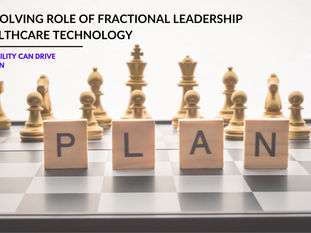
AI in Healthcare: Are We Ready to Trust the Algorithm?
Oct 11, 2024
3 min read
0
2
0

The emergence of AI-powered assessment tools in healthcare is undeniably exciting. We're witnessing incredible advancements: apps that analyse skin conditions with remarkable accuracy, algorithms that detect subtle cues indicative of mental health struggles, and systems that generate comprehensive risk profiles from a simple facial scan. These technologies hold immense promise for early intervention, potentially mitigating the need for more invasive medical procedures down the line.
But a crucial question hangs in the air: can these indicative AI tools evolve beyond simply flagging potential issues? Can they transition from assisting clinicians to actively participating in, or even leading, the diagnostic process? Imagine a future where AI, armed with a patient's medical history and real-time data, not only identifies potential health concerns but also provides definitive diagnoses and recommends personalised treatment plans.
Bridging the Gap Between Indication and Intervention
The current landscape of AI in healthcare echoes the "trust, but verify" approach often seen in the legal sector. AI tools offer valuable insights, but the final decision-making rests firmly in the hands of human professionals. However, as these technologies mature and their accuracy improves, we must ask: at what point does the algorithm match or even surpass clinical intuition? Could these AI tools evolve into something entirely new, reshaping the very foundation of primary care?
The Challenges of Validation and Trust
Several key challenges stand in the way of this transformative vision:
Measuring Success: How do we effectively measure the success of AI-driven interventions when the goal is to prevent something that might have happened? Traditional metrics may not be sufficient to capture the true value of these preventative measures.
Regulatory Hurdles: Achieving medical device classification for AI tools that provide definitive diagnoses is a complex and rigorous process. These technologies must meet stringent standards of safety and efficacy, which can be challenging to demonstrate for algorithms that are constantly learning and evolving.
Liability and Responsibility: The question of liability in the event of an AI-driven misdiagnosis remains a significant concern. Clear legal frameworks are needed to determine who is responsible when AI is actively involved in the diagnostic process.
Data Privacy and Security: As AI tools access and analyse increasingly sensitive patient data, ensuring data privacy and security becomes paramount. Robust safeguards must be in place to protect patient information and maintain trust in these technologies.
The "Black Box" Problem: Many AI algorithms are complex and opaque, making it difficult for clinicians to understand how they arrive at their conclusions. This lack of transparency can erode trust and hinder adoption. If we're going to trust AI with our health, we need to understand its reasoning.
The Need for Integration and Standardisation
Perhaps the biggest challenge facing AI assessment tools is the lack of clear pathways for integration within the healthcare system. Without proper accreditation, standardisation, and adoption strategies, these tools risk becoming fragmented and underutilised.
To realise the full potential of AI in diagnostics and primary care, we need:
Clear regulatory frameworks: Streamlined processes for evaluating and approving AI diagnostic tools as medical devices.
Liability guidelines: Clear guidelines on liability in the event of AI-driven errors.
Transparency and explainability: Algorithms that are transparent and understandable to clinicians.
Integration with existing systems: Seamless integration with electronic health records and other clinical workflows.
Education and training: Equipping healthcare professionals with the knowledge and skills to effectively utilise AI diagnostic tools.
Are We Ready to Trust the Algorithm?
The path towards trusting AI in healthcare requires a careful balance of innovation and caution. We must acknowledge the potential benefits while addressing the ethical, legal, and practical challenges that lie ahead.
This is a conversation we need to have. How do you see AI fitting into the future of healthcare? Share your thoughts and let's shape the future together.
#AIinHealthcare #HealthTech #DigitalHealth #Diagnostics #Innovation #UserAdoption #MedicalDevices #Liability #FutureofHealthcare






